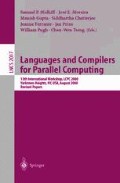Abstract
This paper presents recursion unrolling, a technique for improving the performance of recursive computations. Conceptually, recursion unrolling inlines recursive calls to reduce control flow overhead and increase the size of the basic blocks in the computation, which in turn increases the effectiveness of standard compiler optimizations such as register allocation and instruction scheduling. We have identified two transformations that significantly improve the effectiveness of the basic recursion unrolling technique. Conditional fusion merges conditionals with identical expressions, considerably simplifying the control flow in unrolled procedures. Recursion re-rolling rolls back the recursive part of the procedure to ensure that a large unrolled base case is always executed, regardless of the input problem size.
We have implemented our techniques and applied them to an important class of recursive programs, divide and conquer programs. Our experimental results show that recursion unrolling can improve the performance of our programs by a factor of between 3.6 to 10.8 depending on the combination of the program and the architecture.
Access this chapter
Tax calculation will be finalised at checkout
Purchases are for personal use only
Preview
Unable to display preview. Download preview PDF.
References
S. Amarasinghe, J. Anderson, M. Lam, and A. Lim. An overview of a compiler for scalable parallel machines. In Proceedings of the Sixth Workshop on Languages and Compilers for Parallel Computing, Portland, OR, August 1993.
Andrew W. Appel. Unrolling recursion saves space. Technical report CS-TR-363-92, Princeton University, March 1992.
C. Chambers and D. Ungar. Customization: Optimizing compiler technology for SELF, a dynamically-typed object-oriented programming language. In Proceedings of the SIGPLAN’ 89 Conference on Program Language Design and Implementation, Portland, OR, June 1989. ACM, New York.
P. Chang, S. Mahlke, W. Chen, and W. Hwu. Profile-guided automatic inline expansion for C programs. Software-Practice and Experience, 22(5):349–369, May 1992.
S. Chatterjee, A. Lebeck, P. Patnala, and M. Thottethodi. Recursive array layouts and fast matrix multiplication. In Proceedings of the 11th Annual ACM Symposium on Parallel Algorithms and Architectures, Saint Malo, France, June 1999.
K. Cooper, M. W. Hall, and L. Torczon. An experiment with inline substitution. Software-Practice and Experience, 21(6):581–601, June 1991.
J. W. Davidson and A. M. Holler. A study of a C function inliner. Software Practice and Experience, 18(8):775–790, August 1988.
J. Frens and D. Wise. Auto-blocking matrix-multiplication or tracking BLAS3 performance from source code. In Proceedings of the 6th ACM SIGPLAN Symposium on Principles and Practice of Parallel Programming, Las Vegas, NV, June 1997.
M. Frigo, C. Leiserson, and K. Randall. The implementation of the Cilk-5 multithreaded language. In Proceedings of the SIGPLAN’98 Conference on Program Language Design and Implementation, Montreal, Canada, June 1998.
F. Gustavson. Recursion leads to automatic variable blocking for dense linear algebra algorithms. IBM Journal of Research and Development, 41(6):737–755, November 1997.
S. Richardson and M. Ganapathi. Interprocedural analysis versus procedure integration. Information Processing Letters, 32(3):137–142, August 1989.
R. Scheifler. An analysis of inline substitution for a structured programming language. Commun. ACM, 20(9), September 1977.
Author information
Authors and Affiliations
Editor information
Editors and Affiliations
Rights and permissions
Copyright information
© 2001 Springer-Verlag Berlin Heidelberg
About this paper
Cite this paper
Rugina, R., Rinard, M. (2001). Recursion Unrolling for Divide and Conquer Programs. In: Midkiff, S.P., et al. Languages and Compilers for Parallel Computing. LCPC 2000. Lecture Notes in Computer Science, vol 2017. Springer, Berlin, Heidelberg. https://doi.org/10.1007/3-540-45574-4_3
Download citation
DOI: https://doi.org/10.1007/3-540-45574-4_3
Published:
Publisher Name: Springer, Berlin, Heidelberg
Print ISBN: 978-3-540-42862-6
Online ISBN: 978-3-540-45574-5
eBook Packages: Springer Book Archive

